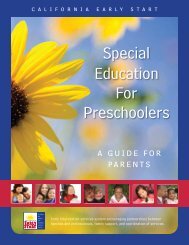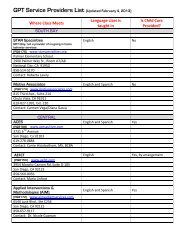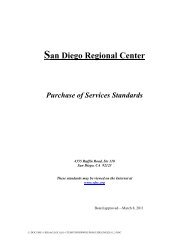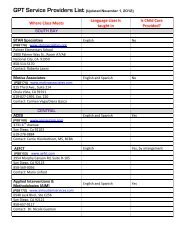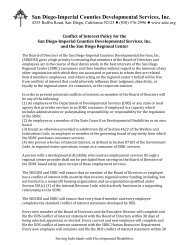Special Education For Preschoolers - San Diego Regional Center
Special Education For Preschoolers - San Diego Regional Center
Special Education For Preschoolers - San Diego Regional Center
You also want an ePaper? Increase the reach of your titles
YUMPU automatically turns print PDFs into web optimized ePapers that Google loves.
9<br />
E A R L Y S T A R T T R A N S I T I O N<br />
Parent Involvement in <strong>Education</strong> Decisions<br />
It is important that you be an involved participant in the decision-making<br />
process at all phases of your child’s education. You are an essential member<br />
of the team that helps to develop the services necessary and the goals your<br />
child will work toward to address his/her needs. Your knowledge of your<br />
child is essential in developing an educational plan.<br />
The Individualized <strong>Education</strong> Plan (IEP)<br />
The IEP is a document that is written for each child with a disability between<br />
the ages of 3-22 years, who is eligible to receive special education. It is<br />
developed by your child’s team and guarantees delivery of appropriate<br />
services for children who meet eligibility requirements. It identifies the<br />
strengths and areas of need(s) of your child as well as the goals and objectives<br />
to address those needs. It also includes other information discussed during<br />
the IEP meeting. The IEP is a plan that is typically written for a year. A copy<br />
of the IEP will be given to you at the end of the meeting.<br />
Each person who participates in the IEP meeting will be asked to sign the IEP.<br />
If you are unsure about the appropriateness of the team’s recommendations<br />
you may:<br />
1. Think about it for a few days<br />
2. Express your disagreement so that more discussion may occur; or,<br />
3. Indicate the parts with which you do agree.<br />
If you have concerns about the IEP and do not sign, you may sign that you<br />
were “In Attendance”. If you disagree with any of the recommendations<br />
regarding your child’s services, and are unable to resolve the issue, your<br />
procedural safeguards (parent’s rights) enable you to exercise your right to<br />
due process. If you need assistance, a district representative is required to<br />
help you with this process. Because districts prefer to work collaboratively<br />
with parents, you are encouraged to contact the District’s Program <strong>Special</strong>ist<br />
or Director of special education if you feel that a disagreement cannot be<br />
resolved with the team. School districts may have personnel and/or services<br />
to help you resolve disagreements.<br />
Remember: You may change your mind and decide you do not want <strong>Special</strong><br />
<strong>Education</strong> services for you child without being concerned that district or<br />
<strong>Regional</strong> <strong>Center</strong> staff will object.




